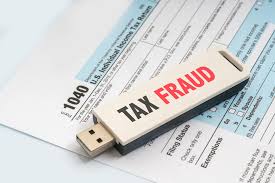Tempted to lie on your taxes? Here are 4 reasons you shouldn’t
The average tax refund is more than $3,000. When you hear that number and do your taxes, only to find out that your refund is much less — or worse, that you owe money — it can be tempting to fudge the numbers and increase your refund.
But misrepresenting your income on your return counts as tax fraud, and has serious consequences. Below, find out what happens if you lie on your taxes and what IRS penalties you could face.
You can get audited
Because the IRS gets all of the 1099s and W-2s you receive, they know if you do not report all of your income. Even if you accept unreported payments in cash or check, your financial activity can reveal red flags about what income you do not report, potentially triggering an audit.
An IRS audit is an extensive review of your taxes and financial records to ensure you reported everything accurately. Though most people have a less than 1% chance of being audited, it’s not worth the risk.
Tax fraud carries heavy penalties & fees
If the IRS does select you for audit and they find errors, the penalties and fines can be steep.fudging your taxes to reduce your tax bill or boost your refund can cost you more in the long run. If you don’t p ay your tax liability by the due date, the IRS will charge you a late payment penalty. Even if you file on time, you may still be charged a late payment penalty if you under report your income and the IRS finds out. And the penalty is just the start. The IRS can also charge you interest on the underpayment as well. If you’re found guilty of tax evasion or tax fraud, you might end up having to pay serious fines
Criminal charges are possible
Besides potentially owing thousands in IRS penalties, fees, and interest, you could also face criminal charges.
Tax fraud is a felony and punishable by up to five years in prison. Failing to report foreign bank and financial accounts might result in up to 10 years in prison.”
Criminal investigations and charges start when an IRS auditor detects possible fraud during their audit of your returns. Courts convict approximately 3,000 people every year of tax fraud, signaling how serious the IRS takes lying on your taxes.
The odds of the IRS charging you for fraud is relatively small — if you’re investigated, the chances are less than 20 percent that you’ll face a criminal charge — but the potential consequences are severe. It’s not worth the risk to get a little extra money in your refund.
You may miss out on a mortgage or loan
Finally, not reporting all of your income can have serious ramifications when it comes to buying a car or a home.
When mortgage companies and banks review your application, they request copies of your tax returns to check your total income. If you lied about your income to lower your tax liability, your full income won’t be on the return. That means you may be denied for the loan you need, hurting your financial future.

The Fresh Start Program
These options do exist and are most commonly utilized when people want to have what they owe entirely forgiven. However, the criteria for getting a debt entirely erased can be stringent and time-consuming. When you want to settle what you owe in a more timely manner, you may select an option that exists under the IRS’ Fresh Start Program.
The Partial Payment Installment Agreement option is the most commonly utilized under this program. The PPIA allows you to make affordable payments on your account until it is paid off in full or you have paid on the debt for 10 years, whichever comes first.
You also could pursue an Offer in Compromise. This option allows you to settle your debt. You could be granted an OIC if you:
- Are in full compliance with the IRS
- Owe a new debt
- Have no plans or cannot file for Chapter 7 bankruptcy
- Have not been turned down for an OIC in the past
You can file for an OIC on the IRS website or allow a tax professional to guide you through the process.
With more than one million people owing it money, the IRS realizes that it cannot collect on every delinquent account. You can have your own account settled or eliminated by exploring these debt relief options.
Can I Sue A Tax Preparer?
Suing a tax preparer is often the last resort since the taxpayer would have to incur significant legal fees. However, if the amount in question is substantial, taking the matter to the court may provide relief from undue taxes and fees. Moreover, if the tax preparer is not registered by the IRS or state-licensed, the only recourse is legal action
You can file a standard professional malpractice complaint with the state court in your jurisdiction.
To avoid dealing with these problems, it is best to research the candidates and find one that suits your needs. For example, if you’re dealing with complex financial situations, you may need regular consultations. IRS has a website where you can find professionals with valid credentials who are up to the task
Fooled by the hope of large refunds
Fraudulent tax preparers will try to lure clients by promising huge refunds.
Those scam artists, who are highlighted year after year in the IRS “dirty dozen” list of most prominent tax scams, often target unsuspecting elderly and low-income taxpayers.
One sign that a tax preparer will inflate your return: They are getting paid based on a percentage of the refund.
“That would be an automatic stop sign for me,”, an enrolled agent and financial advisor based in Cheshire, Connecticut. “It’s in their best interest to get you a larger refund whether it’s real or not.”
Those so-called tax professionals will often beef up your returns by attempting to cheat the system.
That could include using money paid for your commute to work or your business clothes as a deduction.
“They’re not deductions” for most individuals, “I’ve seen people who put down 16,000 miles driving to work as an unreimbursed employee expense on the tax return, and that’s just wrong,” Armstrong said. “It is going to get the taxpayer in trouble upon audit.”
Other traps can range from exaggerations regarding charitable contributions or medical expenses to outright lies regarding marital status or the number of children you have.
“If you have the guts and no ethics, there’s so many ways you can cheat on your tax return in the short run,” But in the long run, you could face steep IRS penalties, even if it was the tax preparer who made the errors.

If your tax preparer does make a mistake on your return, what can you do? Here are five suggestions.
- Contact your preparer
If the IRS sends you a letter claiming that there are mistakes on your taxes, call your tax preparer for an explanation. Tax preparers who do make mistakes might offer to pay any fees, penalties, or interest charges for you. This might not restore your confidence in their abilities, but it will help save your budget.
- Pay the penalties
If the IRS is charging you a penalty for a tax mistake, even if that mistake was made by your preparer, pay it. You might be battling it out with your tax preparer in the hope of getting this professional to pay the penalty on your behalf, but the IRS doesn’t care. If it doesn’t receive its payment, you are the one who will face additional financial penalties.
If your tax preparer refuses to pay for its mistake, send a check to the IRS. Then continue your fight against the preparer.
- Know your rights
Check any contract you signed with your tax preparer. There might be language in the contract stating what your tax preparer will do in the event of a mistake. Some tax preparers will pay the interest and penalties that result from a mistake, but not any extra taxes you might owe.
Some tax preparation firms, especially the big ones, might offer insurance that you can purchase for an extra fee. If you’ve bought this insurance, your tax preparer might be obligated to pay any interest, fees, or extra taxes you owe because of their mistakes.
Be aware that tax preparers won’t pay any penalties on your behalf, even if you’ve purchased extra insurance, if the mistakes they’ve made are because you provided them with inaccurate information.
- Check the statute of limitations
If your tax preparer made a mistake that caused you to overpay on your taxes, you have three years to request a refund from the IRS. You must provide documentation to back up your claim that you overpaid.
This statute of limitations works in reverse, too. If you underpaid your taxes because of a preparer mistake, the IRS has three years in which they can come after you for the money you owe. If your tax preparer made a substantial error, however (such as omitting 25 percent or more of your gross income), the IRS can go back up to six years. It’s recommended to keep your records for at least this long. Be aware there is no statute of limitations for those who knowingly file fraudulent returns, evade taxes, or fail to file altogether.
- File a complaint
If you discover that your preparer made an intentional mistake, perhaps to boost your return, make an official complaint with the Office of Responsibility at the IRS. If your preparer is a member of the American Institute of Certified Public Accountants, National Association of Enrolled Agents, or a state law association, you can also file a complaint with these organizations. Such complaints could cause tax preparers to face fines or lose their licenses.